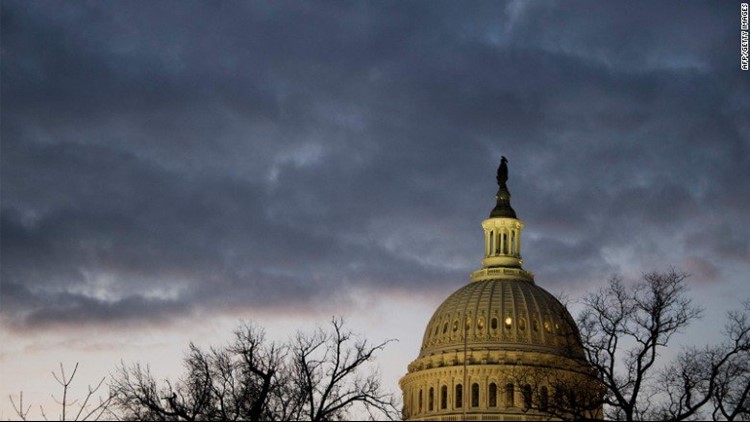WASHINGTON — The Senate voted Monday to end the government shutdown, extending funding for three weeks, following a deal being reached between Senate Minority Leader Chuck Schumer and Senate Majority Leader Mitch McConnell regarding assurances related to immigration.
The bill now goes to the House, which is expected to pass it as early as Monday, and then on to President Donald Trump for his signature.
“We will vote today to reopen the government,” Schumer said earlier on the Senate floor, saying he and Senate McConnell had reached an “arrangement.”
The movement comes thanks in part to commitments from McConnell and other Republicans in bipartisan meetings, according to four Democratic sources.
The Senate passed the procedural vote earlier allowing the bill to advance 81-18.
House GOP lawmakers are largely united and it is expected to pass. But without a guarantee that the House will take up the expiring Deferred Action for Childhood Arrivals program, Minority Leader Nancy Pelosi is planning to vote no, according to a senior Democratic source. That source said a large chunk of Democratic caucus is expected to remain opposed, but GOP leaders feel confident they won’t need much help approving the latest stopgap bill.
The vote came several hours after the workday for hundreds of thousands of furloughed federal employees was supposed to have begun, and it comes three days after the government officially shut down Friday at midnight.
“I don’t think this is the right way to get policy outcomes is to shut the government down. When we tried it, it didn’t work well for us,” GOP Sen. Lindsey Graham of South Carolina told reporters in advance of the vote, appearing alongside GOP Sens. Susan Collins of Maine and Jeff Flake of Arizona. “Here’s what I predict. Once we start talking about immigration and voting on immigration, we’ll find 60 votes to make sure these DACA recipients’ lives are not ruined by March 5.”
The Senate vote was moved from 1 a.m. ET Monday to noon after it became clear Democrats would block the spending bill over disagreements on a variety of issues, most notably what do about young people affected by DACA.
Senate Majority Whip John Cornyn of Texas said he thought Schumer of New York agreed to push back the vote to give his caucus “a chance to chew” on a GOP proposal to break the impasse.
“It’s better to have a successful vote tomorrow at noon than a failed vote tonight,” Cornyn told reporters.
A senior Republican aide told CNN Monday that McConnell wasn’t planning to provide any firmer commitment on immigration than he already has.
“If that’s not enough for Democrats, then we’re in this for the long haul,” the aide said. “If it’s enough for Flake, and Graham, and Collins — who want this done as much as they do — it should be enough for Democrats.”
Flake said Sunday night he was now a “yes” on the funding bill and it was his hope that six or seven more moderate Democrats would come on board to get the continuing resolution over the finish line — to 60 votes — to end the shutdown.
He said the Democrats still want something tangible on DACA but said it was problematic because it could run into the February 8 funding deadline.
He argued that they won a concession from McConnell that he isn’t requiring President Donald Trump to sign off before an immigration bill moves to the floor.
“For the first time, we have the majority leader move off of we can only move something if the President agrees,” Flake told reporters.
Earlier Sunday, Trump called for Senate Republicans to change the chamber’s rules to resolve the funding impasse as the government shutdown continued into its second day. He tweeted a call for McConnell to invoke the so-called “nuclear option” and thereby remove leverage for Senate Democrats.
Senate rules impose a threshold of 60 votes to break a filibuster, and Senate Republicans currently hold a slim majority of 51 votes, meaning even if they can unite their members, they need nine more votes to end debate. The White House is calling for the Senate to change its rules and move the threshold to a simple majority of 51 votes.
A spokesman for McConnell said in response to the tweet that the Senate Republican Conference does not support changing the 60-vote rule, a reiteration of Republican Senate leadership’s already-stated opposition to the move Trump has called for over the past year.



